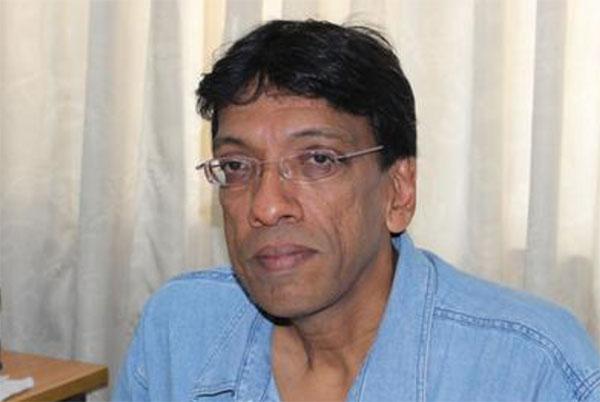Inspector General of Police Deshabandu Tennakoon finds himself at the centre of a controversy that goes to the heart of Sri Lanka’s democracy. The Supreme Court has directed that he should be restrained from acting in the position of head of police until the court has fully considered all the petitions submitted against his appointment. Much to the consternation of law abiding people the government has announced its decision not to act on the Supreme Court interim order restraining Deshabandu Tennakoon from functioning as the Inspector General of Police. Despite the ruling by the highest court in the land, the government insists that the Police IGP will continue to hold office which is not acceptable in a law governed society. The threat to democracy cannot be underestimated.
Delivering a special statement in Parliament, Prime Minister Dinesh Gunawardena stated that the Supreme Court cannot change the approval granted by the Constitutional Council to appoint the current IGP and therefore the IGP continued in his position. The Bar Association has stated that “The claim that the Supreme Court does not have power to question appointments made by the President which are approved by the Constitutional Council is, in the view of the BASL, totally untenable.” President Ranil Wickremesinghe, who has declared his candidacy in the upcoming presidential election, has stated that he will not appoint an acting IGP as this may lead to election petitions being filed against him.
IGP Tennakoon’s appointment was controversial for two reasons in particular. First, he had been found guilty of torture that had taken place over a decade earlier by the Supreme Court no less and fined along with a directive that he be subjected to disciplinary action. This was in addition to a number of other complaints of human rights violations by him on other occasions, including during the Aragalaya protest movement. Instead of being disciplined he was promoted to the position of IGP.
The manner of IGP Tennakoon’s appointment as IGP was also controversial. The constitutional council which was set up to ensure the selection of high officers of state was divided on the issue. According to the constitutional amendment that established the constitutional council, a minimum of five of the nine members in it needed to give their assent to his appointment. Only four members voted in favour. Two opposed his appointment and two abstained. The speaker of parliament who chairs the constitutional council made a controversial decision when he decided to count the two abstentions to be equivalent to votes against appointment of the prospective IGP. As the vote taken would then be tied at four in favour and four against, the speaker used his prerogative of a deciding vote to make it five to four in favour of the appointment.
Government Stance
There were nine petitions filed in the Supreme Court against the appointment of IGP Tennakoon to the highest position in the police. These included the allegation that he had been remiss in his investigations of the Easter bombing of 2019 that led to 250 deaths and a larger number being injured. It was on these grounds among others that the Supreme Court issued an interim order to suspend the IGP from his post until such time as the cases against him were decided.
The government has come up with various arguments against the Supreme Court decision. One is that the constitutional council is part of the legislature and the Supreme Court cannot decide on matters concerning the legislature. The Centre for Policy Alternatives in a statement has noted “that there has been significant misinformation on the validity and the impact of the Supreme Court’s order, including in the Prime Minister’s statement to the House on 27th July. The Supreme Court’s interim order was not against Parliament, nor was it against the Constitutional Council. The Constitutional Council, moreover, is not a committee of Parliament and thus is not protected by the parliamentary privilege of exclusive cognisance.”
Another argument presented by the government is that the president is no longer in a position to appoint an acting IGP as he has declared his candidature at the forthcoming presidential election and can be subjected to election petitions if he does make any acting appointments. The net result is that IGP Tennakoon continues to stay in office. But his stay is in defiance of a Supreme Court judgment. Among the general public there is much deference and respect for judicial decisions. People do not wish to fall into contempt of court by defying the judiciary or speaking disparagingly of it. In this case, however, IGP Tennakoon has powerful allies backing him. They need to find ways to make the acting appointment instead of saying that nothing can be done. Something can be done, and this includes the president making the acting appointment with the assent of the constitutional council, as indeed is constitutionally required, which would protect against charges of bias.
Regrettably, the present governmental stance undermines the foundational principle of parliamentary democracy, which relies on the separation of powers among the presidency, parliament, and the judiciary. These three branches of government are designed to function as a system of checks and balances, preventing the abuse of power by any single branch. The rule of law, is at the basis of democratic governance. The 17th century English philosopher John Locke, asserted that “wherever law ends, tyranny begins.” Similarly, the 17th century French philosopher Montesquieu emphasized the necessity of separating governmental powers to prevent despotism: “There is no liberty if the judiciary power be not separated from the legislative and executive.” The government’s current actions contradict these principles and threaten the balance that sustains Sri Lanka’s democratic system.
Way Out
The government’s refusal to comply with the Supreme Court’s order challenges these principles and undermines the legal framework that supports democratic governance. The notion of judicial review, which allows courts to assess the constitutionality of legislative and executive actions, is integral to maintaining the balance of power. By ignoring the judiciary’s directive, the government not only breaches this balance but also threatens the legal predictability and stability that are vital for societal order.
By disregarding judicial decisions, the government sets a dangerous precedent that could erode public trust in the legal system and encourage similar behavior among elected officials at other levels of government. The general population is bemused by the arguments made by government members regarding the issue of IGP Tennakoon’s continuation in office. The vast majority of the population believe that the Supreme Court is the final arbiter on legal matters and is a last refuge for justice. In addition, the country is on the path to a presidential election in less than two months in which the government can change and the support to IGP Tennakoon can vanish with immediate effect to his detriment.
In these circumstances, it would be judicious of IGP Tennakoon to take the Supreme Court judgment to heart and withdraw himself from performing the IGP’s functions. He would otherwise be in contempt of court. By withdrawing himself from his current duties and responsibilities, he would be showing respect to the judiciary, to the concepts of separation of powers and to the system of checks and balances that form the basis of the system of democratic government. Such an action would also help to defuse a brewing crisis that if escalated could undermine the stability that is needed for the country’s economic recovery. President Wickremesinghe has clearly said this is a danger that needs to be avoided and needs to take remedial action accordingly.
Jehan Perera







